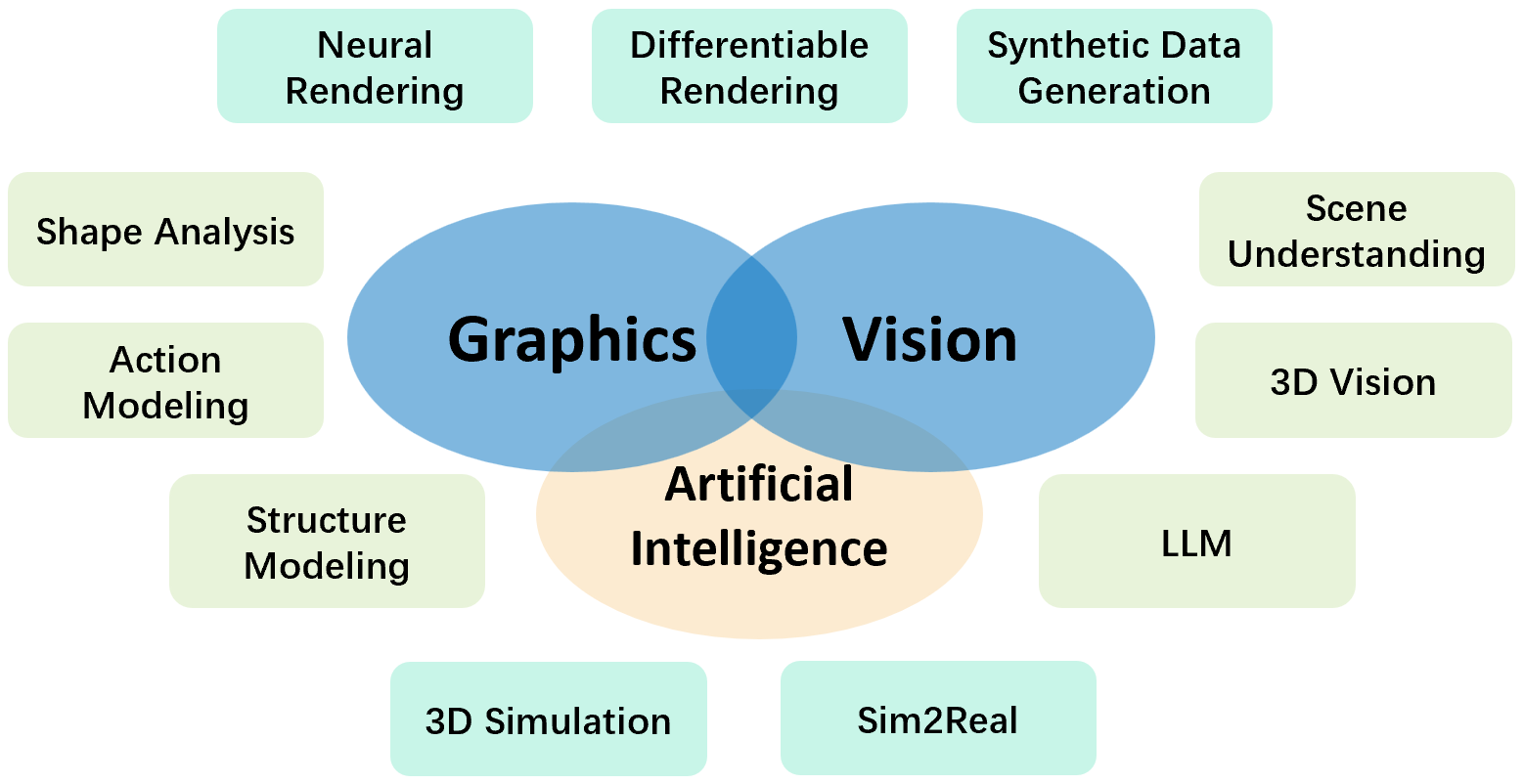Rui Ma
Associate Professor
School of Artificial Intelligence
Jilin University
Rui Ma (马锐) is an Associate Professor in School of Artificial Intelligence, Jilin University, China. Rui leads the Intelligent Content Learning (ICL) group with the goal of developing intelligent algorithms for the analysis, creation and application of X-D content (3D models, images, text and more).
Rui obtained his PhD in 2018 from School of Computing Science, Simon Fraser University, Canada. At SFU, he worked in the GrUVi Lab (World Rank #12 in CG&CV based on CSRankings 2024) under the supervision of Prof. Hao (Richard) Zhang. Before that, Rui got his MSc and BSc from School of Mathematics, Jilin University.
Rui has extensive backgrounds in both academia and industry. During his PhD, Rui has published several papers in Siggraph/Siggraph Asia, the most prestigious conference in computer graphics. After graduation, Rui gained his industrial research experience in the AI-focused start-up company and also the big tech giant (Huawei Canada), working on the state-of-the-art AI algorithms and their applications. Rui has wide collaborations with talented researchers from top universities (Stanford, SFU, Tsinghua etc.) and companies (Adobe, Microsoft, Google etc.). He also has close connections with researchers in Huawei, ByteDance and Alibaba etc.
-
PhD in Computing Science, 2018
Simon Fraser University, BC, Canada
-
MSc in Computational Mathematics, 2013
Jilin University, Changchun, China
-
BSc in Information and Computing Science, 2010
Jilin University, Changchun, China
-
Associate Professor, Sept 2021 to Present
Jilin University, Changchun, China
-
Senior Researcher, Aug 2019 to Aug 2021
Huawei Technologies, BC, Canada
-
Research Scientist, Jan 2018 to Aug 2019
AltumView Systems, BC, Canada
-
2025.8: Two papers accepted by CAD/Graphics 2025 and recommended to Graphical Models (CCF-B). Congrats to Bowei Jiang and Ye Wang! Special congratulations to Ye Wang for winning the Honorable Mention at CAD/Graphics 2025!
-
2025.6: One paper accepted by ICCV 2025 (CCF-A). Congrats to Peng Zheng!
-
2025.2: Four papers accepted by CVPR 2025 (CCF-A). Congrats to Ye Wang, Tongyuan Bai and Yibo Zhang!
-
2025.1: One paper accepted by ICLR 2025 (CAAI-A). Congrats to Yibo Zhang!
-
2024.12: Two papers accepted by AAAI 2025 (CCF-A). Congrats to Ye Wang!
-
2024.12: One paper accepted by CVM 2025. Congrats to Ye Wang!
-
2024.12: I am fortunate to serve as the Publicity Chair of CCF CAD/CG 2024 (第28届全国计算机辅助设计与图形学学术会议) and GDC 2024 (第17界全国几何设计与计算学术会议).
-
2024.10: One paper accepted by CVMJ 2025. Congrats to Shida Wei!
-
2024.8: I was fortunate to get the Best Reviewer Award of CCF CAD/CG 2024 (第27届全国计算机辅助设计与图形学学术会议).
-
2024.8: Two papers accepted by PG 2024 (CCF-B), with one of them recommended to be published in CGF (CCF-B). Congrats to Jiacheng Liu and Ruiqi Liu!
-
2024.7: One paper accepted by ECCV 2024 (CAAI-A). Congrats to Peng Zheng!
-
2024.3: One paper accepted by SIGGRAPH 2024 (CCF-A).
-
2024.2: One paper accepted by CVPR 2024 (CCF-A).
-
2023.12: Two papers accepted by AAAI 2024 (CCF-A). Congrats to Dong Chen and Hao Wang!
-
2023.8: Our paper P2M2-Net: Part-Aware Prompt-Guided Multimodal Point Cloud Completion won the Best Poster Award in CAD/Graphics 2023. Congrats to Linlian Jiang!
-
2022.12: Our paper SAC-GAN: Structure-Aware Image Composition is accepted by IEEE Transactions on Visualization and Computer Graphics (TVCG, CCF-A).
-
2021.9: I joined School of AI, Jilin University as Associate Professor.
-
2021.8: Our paper RaidaR: A Rich Annotated Image Dataset of Rainy Street Scenes is accepted in the 2nd Autonomous Vehicle Vision (AVVision) Workshop for ICCV2021, Montreal, Canada.
-
2021.6: Our paper View-Aware Geometry-Structure Joint Learning for Single-View 3D Shape Reconstruction is accepted by IEEE Transactions on Pattern Analysis and Machine Intelligence (TPAMI, CCF-A, Impact Factor 16.389).
-
2019.8: I joined Huawei Canada as a Researcher, focusing on computer vision, computer graphics and artificial intelligence research.
-
2017.9: I successfully defended my PhD thesis “Sub-Scene Level Analysis and Synthesis of 3D Indoor Scenes” with the “Defense and thesis Pass As Is” distinction.
-
My main research interests include computer graphics, computer vision and artificial intelligence. Specifically, I am focusing on content creation for 3D scenes/shapes and 2D visual media. The goal of my research is to enable novice users to create high quality and customized content through intelligent algorithms and intuitive interfaces (such as examples, images and natural language).
-
I am also highly interested in the direction of using computer graphics techniques (e.g., data synthesis) to boost computer vision tasks such as 2D/3D understanding, segmentation, as well as 3D reconstruction.

- Chairs: CADCG/GDC 2025 (Publicity Chair), PG2024 (Session Chair), 3DV2025 (Area Chair)
- Program Committee: AAAI (2023-2025), SGP (2024-2025), CVM (2023-2025), CGI (2023-2024), CADCG (2024-2025), GDC (2022-2025), CAD/Graphics (2023).
- Reviewer (journal): IEEE TVCG, Computational Visual Media Journal, Computer Graphics Forum, Graphical Models
- Reviewer (conference): SIGGRAPH (Asia), CVPR, ICCV, ECCV, ACM MM, EG, IEEE VR, ICRA, Graphics Interface
- Honorable Mention, CAD/Graphics, Yantai, China, 2025
- Best Reviewer Award, CCF CAD/CG, Nanchang, China, 2024
- Best Poster Award, CAD/Graphics, Shanghai, China, 2023
- Award of Excellence, Stars of Tomorrow Internship Program, Microsoft Research Asia, 2016
- Mitacs Globalink Research Award, Mitacs Canada, 2015
- Best Poster Award, Geometric Design & Computing (GDC), Guangzhou, China, 2011